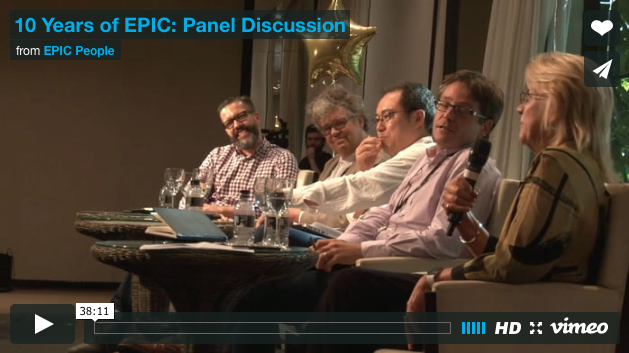
Foundational AI: Navigating a Shifting Terrain
New deployments of foundational AI models in digital products have expanded public engagement with synthetic text, audio, images, and video production. Themes that...

10 Years of EPIC, Part V: Panel Discussion
Special Session: 10 Years of EPIC Part 1: ken anderson, Intel Part 2: Hiroshi Tamura, Re:public Inc. Part 3: Jeanette Blomberg, IBM Part 4: Simon Roberts, Stripe...

Abstract 2.0: If We Are All Shouting, Is there Anyone Left to Listen?
This paper explores notions of ‘voice’ as it relates to Web 2.0. We begin by tracing the social meanings of Web 2.0 technologies Brazil. There the notions of...

We We We All The Way Home: The “We” Affect in Transitional Spaces
The majority of ethnographic studies for businesses have focused on places: home, work, “third places,” and even “non-places”. Daily life, however, is composed...

Service Infrastructures: A Call for Ethnography of Heterogeneity
This paper investigates the notion of heterogeneity, inspired by Latour’s work on Actor Network Theory, as a lens for understanding daily work practices in a large...

Consumerization and Renewing Peoples and Practices Research
This paper documents the beginnings of Intel’s recently launched Consumerization project, and uses these early experiences as a way into exploring new paths to...

The Politics of Visibility: When Intel Hired Levi-Strauss, or So They Thought
This paper examines the politics of visibility – the ways in which the work of ethnographers is positioned inside and outside organizations not only as means of...

And now a word from the EPIC2014 co-organizers . . .
The practice of ethnography can be described, among other ways, has having the emergent qualities of relationality, fluidity and creating a sense of place. These...

Taking the Driver’s Seat: Sustaining Critical Enquiry While Becoming a Legitimate Corporate Decision-Maker
Staying relevant (to the business) is at the heart of career-advancement and (increasingly) job-security, particularly, in a business unit. It embodies a number...
